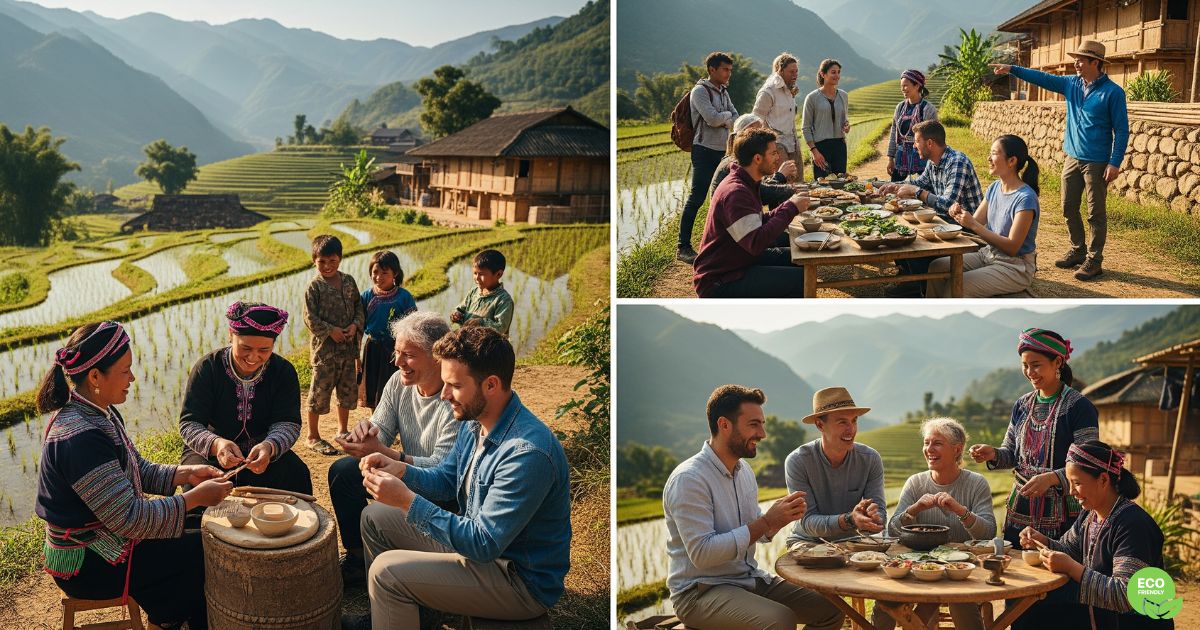
Travel has evolved far beyond checking destinations off a bucket list. Modern travelers seek meaningful connections, authentic experiences, and ways to make a positive impact on the places they visit. Community-based tourism emerges as a powerful answer to these desires, offering a transformative approach that benefits both visitors and local communities.
This travel philosophy shifts focus from mass tourism’s extractive model to one centered on genuine cultural exchange and economic empowerment. Rather than simply passing through destinations, travelers become active participants in local life, staying in homestays, learning traditional crafts, and supporting village-led initiatives.
The concept addresses growing concerns about tourism’s environmental and social impact while satisfying travelers’ hunger for authentic experiences. As destinations worldwide grapple with overtourism and communities seek sustainable economic opportunities, community-based tourism presents a compelling path forward.
This comprehensive guide explores how supporting local communities through travel creates lasting benefits for everyone involved, from preserving cultural heritage to fostering genuine human connections that transcend geographical boundaries.
Understanding Community-Based Tourism
Community-based tourism represents a grassroots approach to travel where local communities take ownership of tourism development in their areas. Unlike traditional tourism models controlled by external operators, this approach ensures communities directly benefit from visitor spending while maintaining control over their cultural narrative and natural resources.
The model typically involves small-scale operations run by community members themselves. Visitors might stay with local families, participate in traditional fishing expeditions, learn ancestral cooking methods, or join conservation efforts alongside residents. These experiences generate income that stays within the community rather than flowing to distant corporate headquarters.
Key Characteristics of Community-Based Tourism:
- Local ownership and management of tourism services and experiences
- Direct economic benefits flow to community members
- Cultural authenticity preserved and shared on the community’s terms
- Environmental conservation integrated into tourism activities
- Visitor education about local customs, challenges, and traditions
This tourism model recognizes that communities are not merely backdrops for visitor experiences but active partners in creating meaningful travel encounters. The approach respects local decision-making processes and ensures tourism development aligns with community values and long-term goals.
Economic Benefits of Supporting Local Communities

The economic advantages of community-based tourism extend far beyond simple transaction exchanges. When travelers choose locally-owned accommodations, eat at family restaurants, and purchase handmade crafts directly from artisans, they create multiplier effects that strengthen entire local economies.
Direct Economic Impact
Money spent on community-based tourism typically circulates within local economies multiple times before leaving the area. A homestay payment might help a family purchase supplies from local vendors, who then spend that income at neighborhood shops, creating a ripple effect of economic activity.
Small-scale tourism operations require relatively modest infrastructure investments compared to large resort developments, making them accessible to communities with limited capital. Families can convert spare rooms into guest accommodations, fishermen can offer boat tours, and skilled craftspeople can demonstrate traditional techniques to visitors.
Employment Creation and Skill Development
Community-based tourism creates diverse employment opportunities that utilize existing local skills while encouraging the development of new ones. Village tours need knowledgeable guides who understand local history and ecology. Cultural demonstrations require skilled artisans and performers. Homestays need hosts comfortable interacting with international visitors.
These positions often provide more stable income than traditional seasonal work, helping communities weather economic fluctuations. They also encourage preservation of traditional skills that might otherwise disappear as younger generations move to urban areas seeking employment.
Economic Diversification
Rural communities heavily dependent on agriculture or resource extraction benefit enormously from tourism-related income diversification. Community-based tourism provides alternative revenue streams that don’t require abandoning traditional livelihoods but rather complement them.
Farmers might offer agritourism experiences showcasing traditional farming methods. Fishing communities can provide boat tours or teach visitors traditional fishing techniques. This diversification reduces economic vulnerability while celebrating existing community strengths.
Cultural Exchange and Preservation
Community-based tourism creates unprecedented opportunities for meaningful cultural exchange that benefits both visitors and host communities. Unlike surface-level cultural interactions common in mass tourism, this model facilitates deep, respectful engagement with local traditions and ways of life.
Authentic Cultural Immersion
Staying in homestays allows visitors to observe daily life rhythms, participate in family activities, and understand cultural practices from an insider perspective. Guests might help prepare traditional meals, participate in religious ceremonies, or learn customary greetings and social protocols.
These experiences provide visitors with genuine cultural insights impossible to obtain from guidebooks or brief tourist interactions. They develop an appreciation for different worldviews, problem-solving approaches, and community relationship structures.
Preserving Traditional Knowledge
Community-based tourism creates economic incentives for preserving traditional knowledge and practices that globalization often threatens. When tourists pay to learn traditional weaving techniques, participate in ancient festivals, or understand medicinal plant uses, communities recognize the value of maintaining these traditions.
Elder community members become valuable cultural teachers, passing knowledge to both visitors and younger community members who might otherwise lose interest in traditional ways. This intergenerational knowledge transfer strengthens cultural continuity while generating income.
Language Preservation
Cultural exchange through community-based tourism often involves local language learning and use. Visitors attempting to communicate in local languages show respect and genuine interest in the culture, while community members practicing foreign languages develop valuable skills.
These linguistic exchanges help preserve local languages by demonstrating their continuing relevance and value. Children see their native languages appreciated by international visitors, encouraging continued use alongside dominant national languages.
Environmental Sustainability and Conservation

Community-based tourism naturally aligns with environmental conservation principles since local communities have long-term stakes in protecting their natural resources. Unlike external tourism operators who might prioritize short-term profits, communities understand that environmental degradation threatens their future livelihood and well-being.
Conservation Through Economic Incentives
When natural areas generate tourism income, communities become motivated guardians of these environments. Forests that provide wildlife viewing opportunities become more valuable standing than cleared for agriculture. Coral reefs supporting dive tourism receive protection from fishing practices that might damage them.
Local guides trained in ecology and conservation become passionate advocates for environmental protection. They understand that healthy ecosystems attract visitors and generate income, creating powerful economic arguments for conservation alongside traditional cultural and spiritual reasons.
Small-Scale, Low-Impact Operations
Community-based tourism typically operates at scales that minimize environmental impact. Small group sizes, locally-sourced materials, and human-powered transportation reduce carbon footprints compared to mass tourism operations.
Village tours using traditional boats create minimal water pollution. Hiking trails maintained by local guides prevent erosion and habitat damage. Organic gardens supplying homestays avoid chemical pesticides and fertilizers. Many programs even partner with Eco-Friendly Accommodations, ensuring that travelers stay in lodgings aligned with sustainability values.
Waste Management and Resource Conservation
Community-based tourism operations often demonstrate innovative approaches to waste management and resource conservation born from necessity and environmental awareness. Composting toilets, rainwater collection systems, and solar cooking methods show visitors sustainable living practices.
These demonstrations educate travelers about environmental challenges and solutions while proving that comfortable, enjoyable experiences don’t require resource-intensive infrastructure.
Social Empowerment and Community Development

Community-based tourism catalyzes broader social development by building local capacity, strengthening community organizations, and increasing residents’ confidence in their ability to create positive change.
Building Local Leadership
Organizing and managing tourism activities requires communities to develop leadership structures, decision-making processes, and conflict resolution mechanisms. These organizational skills transfer to other community development initiatives, from infrastructure improvement to education programs.
Community members who become confident interacting with international visitors often emerge as leaders in other contexts. They develop communication skills, cultural sensitivity, and project management abilities valuable for various community development activities.
Women’s Empowerment
Community-based tourism often provides particular opportunities for women’s economic empowerment. Homestay hosting, craft production, and food preparation activities align with traditional women’s roles while generating independent income and increasing social status.
Women who successfully manage tourism activities often gain a greater voice in community decision-making. They demonstrate economic capabilities that challenge traditional gender role limitations while working within culturally appropriate frameworks.
Education and Capacity Building
Tourism interaction motivates community members to improve language skills, learn about visitor cultures, and develop service industry knowledge. These educational pursuits benefit individuals and communities beyond tourism contexts.
Young people who might otherwise migrate to urban areas for education and employment opportunities may choose to remain in their communities when tourism provides viable local career paths.
Challenges and Considerations
Despite significant benefits, community-based tourism faces various challenges that require careful consideration and proactive management. Understanding these potential issues helps communities and visitors work together to maximize positive impacts while minimizing negative ones.
Balancing Tradition and Change
Tourism inevitably brings change to communities, and finding an appropriate balance between cultural preservation and adaptation challenges every destination. Communities must decide which traditions to share with visitors, how to present them authentically, and what aspects of local life to keep private.
Some traditional practices might be inappropriate for visitor participation due to sacred significance or safety concerns. Communities need frameworks for making these decisions collectively while respecting different viewpoints within the community.
Managing Visitor Expectations
Community-based tourism experiences differ significantly from conventional tourism accommodations and services. Visitors expecting hotel-level amenities or highly structured itineraries might feel disappointed with authentic community experiences that emphasize flexibility and cultural exchange over polished service delivery.
Clear communication about experience nature, accommodation standards, and activity flexibility helps ensure visitor satisfaction while protecting community members from unrealistic demands.
Building Tourism Management Skills
Many communities interested in tourism development lack experience with marketing, customer service, and business management. Developing these capabilities requires training, practice, and ongoing support from tourism professionals and organizations.
Language barriers, limited internet access, and unfamiliarity with international travel booking systems can impede community tourism development without appropriate capacity-building assistance.
Planning Your Community-Based Tourism Experience

Travelers interested in supporting local communities through tourism can take several steps to ensure their travel choices create maximum positive impact while providing personally meaningful experiences.
Research and Selection
Identifying authentic community-based tourism opportunities requires research beyond conventional travel booking platforms. Look for operations with clear community ownership, transparent benefit distribution, and a genuine cultural exchange focus rather than performances created solely for tourist consumption.
Reputable organizations often certify legitimate community-based tourism operators or provide directories of verified community tourism initiatives. Academic institutions, development organizations, and ethical travel companies can provide valuable guidance.
Preparation and Cultural Sensitivity
Successful community-based tourism experiences require visitor preparation and cultural sensitivity. Learn basic information about the destination’s history, customs, and current challenges. Understand appropriate behavior, dress codes, and interaction protocols.
Prepare for different comfort levels, communication styles, and activity paces than conventional tourism experiences. Flexibility, patience, and genuine curiosity enhance experiences for everyone involved.
Meaningful Engagement
Approach community-based tourism as an opportunity for mutual learning and exchange rather than consumption of exotic experiences. Ask questions respectfully, share information about your own culture when appropriate, and look for ways to contribute constructively to community life during your visit.
Consider longer stays that allow deeper relationships to develop and provide more substantial economic benefits to host communities. Extended visits enable participation in multiple community activities and the development of genuine friendships.
Learn More: Sustainable Travel Guide For Explore Responsibly
The Transformative Power of Responsible Travel
Community-based tourism represents more than an alternative travel option—it embodies a fundamental shift toward more responsible, meaningful, and mutually beneficial relationships between travelers and destinations. This approach recognizes that authentic travel experiences emerge from genuine human connections and shared understanding rather than superficial cultural consumption.
The model’s success depends on collaboration between committed communities, responsible travelers, and supportive organizations working together to create tourism that strengthens rather than exploits local cultures and environments. When implemented thoughtfully, sustainable tourism generates lasting positive change that extends far beyond immediate economic transactions.
As travelers increasingly seek authentic experiences and meaningful connections, supporting local communities through tourism choices becomes both personally rewarding and globally important. Each decision to choose homestays over hotels, local guides over tour companies, and community-owned restaurants over international chains contributes to a more sustainable and equitable tourism industry.
The future of travel lies not in extracting experiences from destinations but in building relationships with communities, supporting local development goals, and creating positive change through conscious travel choices. Community-based tourism offers a pathway toward this future—one authentic experience, one meaningful connection, and one supported community at a time.

















No Comments